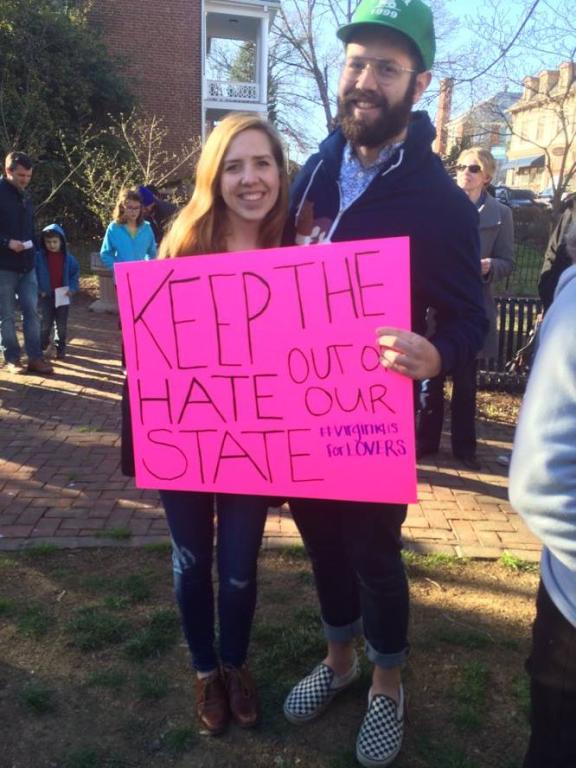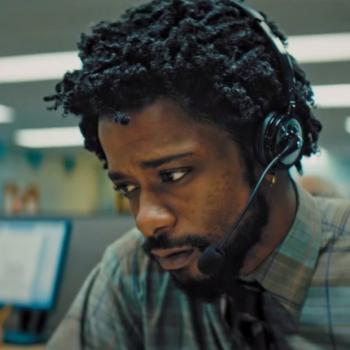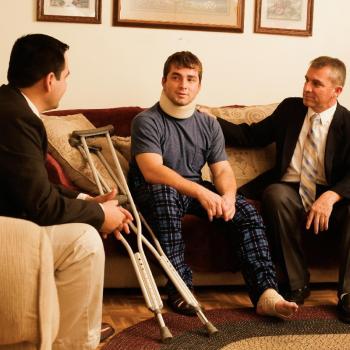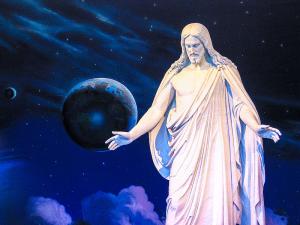
This week I went to an anti-racism rally here in Lexington, Virginia in response to Ku Klux Klan fliers being dropped around town. It was such a remarkable experience. It was uplifting and awesome for a multitude of reasons. I got to hear people stand and repudiate the KKK. A black Washington and Lee professor stood up and called on us to examine more than just the clearly racist actions of a few; to be introspective in how we are complicit in structural oppression and white supremacy. We stood and listened to a student tell us about her fears as a black woman living in a city that contains the graves of both Robert E. Lee and Stonewall Jackson. It was a powerful event. One that truthfully felt as spiritual as the sacrament meetings I attend every week. This makes sense because the event was organized and led by a Lutheran pastor in the area and supported by other local churches.
But there was one major thing that really stood out to me that made me sad. Something I have long struggled with. I ache for ecclesiastical leaders who comment on serious moral issues. Leaders who call us from the comfortable complacency that is so easy to fall into.
There were eight people from my school who went (Southern Virginia University is 15 minutes away) Four of the people who came were professors, and of those four professors who came, two aren’t Mormon (one is even an Episcopalian preacher). There were only two other SVU students there aside from my fiancée and I.
So often, civil rights movements are filled with religious leaders. People who have felt a godly calling to protect the most needy in our society. Many of the most vocal anti slavery abolitionists were Quakers, induced by their faith to call out injustice. We idolize Martin Luther King Jr. (a Baptist pastor) for his principled stand against racism in the south. The Civil Rights movement of the 1960s was filled with clergy and others who acted out of a moral calling to do so.
But, what do we as Mormons get? Lectures about porn, and the abstract idea of protecting the family.
We get talks from Elder Holland stating:
“Sadly enough, my young friends, it is a characteristic of our age that if people want any gods at all, they want them to be gods who do not demand much, comfortable gods, smooth gods who not only don’t rock the boat but don’t even row it, gods who pat us on the head, make us giggle, then tell us to run along and pick marigolds.
“Talk about man creating God in his own image! Sometimes—and this seems the greatest irony of all—these folks invoke the name of Jesus as one who was this kind of ‘comfortable’ God.”
I know that Jesus wasn’t a ‘comfortable’ God. Jesus was a radical. His message of unconditional love is not something that is easy. It is comforting, but at the same time terrifying because through it we are asked the same thing. We are asked to love. And to protect those who need protecting. And it turns out, that can be pretty hard.
So, yes. The ache in my heart is still there, the desire for an apostle to stand up next week at conference and call us to examine our own prejudices. To look deep inside our history and shine light on the icky hard things that come with being white in America. I want a leader to stand up and acknowledge publicly that racism was a major contributing factor in the withholding of the priesthood and temple blessings for people of African descent rather than the church just publishing a little read essay on their website.
I want to protect the family. But same sex marriage isn’t destroying families. Instead issue calls of action to protect the family by speaking out against acts of racism. Protect the family by decrying the militarization of police and the deaths of young people of color. Protect the family by taking a moral stand on national issues like prison reform and not just the supposed evils of same sex marriage. I want you to protect my family by warning about the perils of income inequality and climate change. I’m deeply worried that the children I hope to have will have to deal with unprecedented rising of sea levels, dangerous weather patterns, famines and poverty caused by a broken economic system.
No one will commit suicide if you make statements about those things. The same can’t be said for LGBTQ members of the church.
The church does good in the world. I can’t deny that, however there is so much more potential for good. So why aren’t we? Prophetic moral authority loses its legitimacy when serious moral issues arise and nothing is said.
So, I’m going to run along and pick marigolds, and then I’ll take them and lay them gently at the graves of the people who have suffered from your silence on these moral issues.
Colin Smith is a student of history at Southern Virginia University. He likes animals, Hamilton, and primary source documents.
Like Peculiar People on Facebook:











